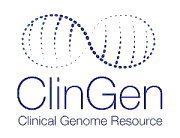The ClinGen Evidence Repository is an FDA-recognized human genetic variant database containing expert-curated assertions regarding variants' pathogenicity and supporting evidence summaries.
[Disclaimer]
- Gene label mismatch: USH2A vs undefined
- Gene obtained from curated document aligns with the Allele Registry but not with ClinVar data
Variant: NM_206933.3(USH2A):c.13217T>C (p.Leu4406Pro)
- Curation Version - 1.1
- Curation History
- JSON LD for Version 1.1
CA1393328
556334 (ClinVar)
Gene: USH2A
Condition: Usher syndrome
Inheritance Mode: Autosomal recessive inheritance
UUID: fe6a89b4-9531-4e0d-bb24-5664264466f0
Approved on: 2024-11-20
Published on: 2025-03-27
HGVS expressions
NM_206933.3:c.13217T>C
NM_206933.3(USH2A):c.13217T>C (p.Leu4406Pro)
NC_000001.11:g.215674694A>G
CM000663.2:g.215674694A>G
NC_000001.10:g.215848036A>G
CM000663.1:g.215848036A>G
NC_000001.9:g.213914659A>G
NG_009497.1:g.753703T>C
NG_009497.2:g.753755T>C
ENST00000307340.8:c.13217T>C
ENST00000674083.1:c.13217T>C
ENST00000307340.7:c.13217T>C
NM_206933.2:c.13217T>C
NM_206933.4:c.13217T>C
More
Evidence submitted by expert panel
The information on this website is not intended for direct diagnostic use or medical decision-making without review by a genetics professional. Individuals should not change their health behavior solely on the basis of information contained on this website. If you have questions about the information contained on this website, please see a health care professional.
